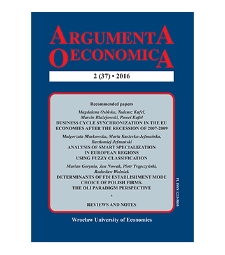Dolnośląska Biblioteka Cyfrowa udostępnia 109 193 obiektów cyfrowych
Obiekt
Tytuł: Business cycle synchronization in the EU economies after the recession of 2007-2009
Autor:
Osińska, Magdalena ; Kufel, Tadeusz ; Błażejowski, Marcin ; Kufel, Paweł
Opis:
Argumenta Oeconomica, 2016, Nr 2 (37), s. 5-30
Abstrakt:
Wydawca:
Wydawnictwo Uniwersytetu Ekonomicznego we Wrocławiu
Miejsce wydania:
Data wydania:
Typ zasobu:
Identyfikator zasobu:
doi:10.15611/aoe.2016.2.01 ; oai:dbc.wroc.pl:35008
Język:
Powiązania:
Argumenta Oeconomica, 2016, Nr 2 (37)
Prawa:
Wszystkie prawa zastrzeżone (Copyright)
Prawa dostępu:
Dla wszystkich w zakresie dozwolonego użytku
Lokalizacja oryginału:
Kolekcje, do których przypisany jest obiekt:
- Dolnośląska Biblioteka Cyfrowa > Uczestnicy Konsorcjum > 04. Uniwersytet Ekonomiczny we Wrocławiu > Czasopisma wydawane przez Wydawnictwo UEW > Argumenta Oeconomica
- Dolnośląska Biblioteka Cyfrowa > Zasoby > 2. Czasopisma > Czasopisma współczesne
Data ostatniej modyfikacji:
26 maj 2022
Data dodania obiektu:
9 lis 2016
Liczba wyświetleń treści obiektu:
377
Liczba wyświetleń treści obiektu w formacie PDF
431
Wszystkie dostępne wersje tego obiektu:
https://www.dbc.wroc.pl/publication/38474
Wyświetl opis w formacie RDF:
Wyświetl opis w formacie OAI-PMH:
| Nazwa wydania | Data |
|---|---|
| Business cycle synchronization in the EU economies after the recession of 2007-2009 | 26 maj 2022 |
Obiekty Podobne
Kufel, Tadeusz Osińska, Magdalena Błażejowski, Marcin Kufel, Paweł
Kufel, Tadeusz Osińska, Magdalena Błażejowski, Marcin Kufel, Paweł
Błażejowski, Marcin Kufel, Paweł Kufel, Tadeusz
Błażejowski, Marcin Kufel, Paweł Kufel, Tadeusz
Kufel, Tadeusz Błażejowski, Marcin Kufel, Paweł
Błażejowski, Marcin Kufel, Paweł Kufel, Tadeusz
Kijek, Arkadiusz Mercik, Jacek Wiesław. Redakcja
Kufel, Tadeusz Błażejowski, Marcin
























